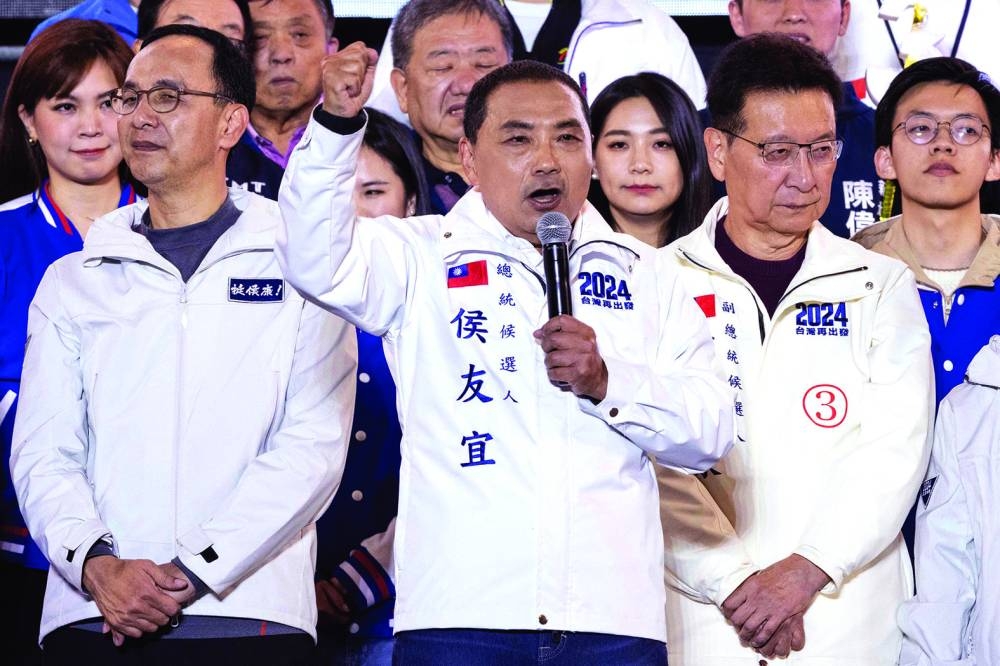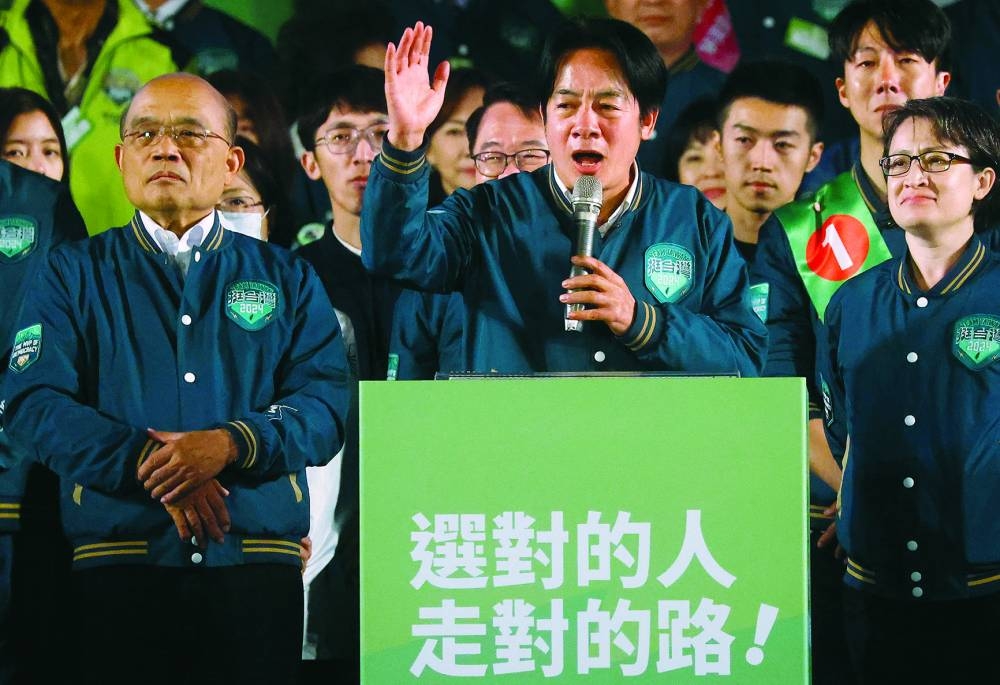Hundreds of thousands of people flocked to noisy closing rallies yesterday as Taiwan’s presidential candidates made a last push for votes in an election that China has warned could take the island closer to war. Taiwan’s bustling democracy of 23mn people is separated by a narrow 180km strait from Communist-ruled China, which claims the island as part of its territory.
Today’s election is being closely watched around the world as the winner will lead the strategically important island - a major producer of vital semiconductors - as it manages ties with an increasingly assertive China. Vice-President Lai Ching-te, the front-runner candidate of the ruling Democratic Progressive Party (DPP), paints the election as a choice between “democracy and autocracy” - criticising his main opponent Hou Yu-ih of the Kuomintang (KMT) for being too “pro-China”.
“After I get elected as the president, I will continue to take the path of democracy and peace. I will stand with the international camp of freedom and democracy. What’s more, I will forever stand with Taiwan’s people,” he said. In a stadium nearby, Hou called for his red-and-blue-clad supporters to kick out the DPP, which has been in power for eight years. “This is a choice between war and peace...If Lai Ching-te is elected, the Taiwan Strait is very likely to fall into unrest,” said Hou. “Don’t say that we are pro-China,” said supporter Minai at Hou’s final rally. “We just want the peaceful co-existence of both sides...I don’t want there to be a war.”
Hou, a former police chief who portrays himself as a “protector” of Taiwan, is echoing a line from Beijing, which has blasted Lai as a dangerous “separatist” who will bring “war and decline” to Taiwan. Barely 12 hours before polls opened, China’s defence ministry denounced the DPP for pushing “Taiwan toward the dangerous conditions of war” and said it will “crush” any attempts at Taiwan’s “independence”. Beijing has never renounced the use of force to bring Taiwan under its control. In recent years it has maintained a near-daily military presence around Taiwan, sending in warplanes and ships to its surroundings in “grey zone” harassment actions which fall short of outright provocation.
The weeks leading up to Saturday’s vote have also seen a flurry of Chinese balloons crossing the Taiwan Strait’s sensitive median line - with a record five balloons appearing on Thursday - which Taipei has slammed as a form of election interference. All the sabre-rattling from across the Taiwan Strait means the island must build up its “self-defence to prevent the other side from bullying us”, said DPP supporter Yoyo Chen.
“I will fight them even if all I have left is a broomstick,” said the 30-year-old tailor at the DPP rally.
The election has drawn massive attention overseas, as Taiwan’s next leader will determine future cross-strait relations with China in a flashpoint region that has Beijing and Washington tussling for influence. In a sign of the importance the United States attaches to the election, Secretary of State Antony Blinken will hold talks with a senior Chinese official in Washington on Friday as the Americans seek to discourage Beijing from taking action against Taipei. In Taipei, supporters of third-party candidate Ko Wen-je - who has made an unexpected show of force in the race - gathered outside the Presidential Office on the sprawling Ketagalan Boulevard, shouting that he is “Taiwan’s choice”. The leader of the small Taiwan People’s Party (TPP), Ko has criticised his opponents for being caught up in ideological deadlock, attracting voters who say they are sick of talking about China.
“Let’s not be divided by colours anymore. We must try our best to unite each other,” he said, referring to the two dominant parties. Supporter Lisa Sun, 42, said she was ready for change. “I hope (Ko) can change Taiwan. Blue and green have each been in power... and nothing much has changed in Taiwan,” she told AFP. No matter who wins on Saturday, it remains unclear which candidate Beijing prefers, said Marc Julienne, head of China research at the French Institute of International Relations.
All three candidates - from the DPP, KMT and TPP - have said they will maintain the island’s status quo, and rejected “one country, two systems”, a Beijing doctrine used for governing Hong Kong and Macau.
“Today there is no political party that is pro-People’s Republic of China,” Julienne said, referring to China’s official name. “At the end of the day, it’s the Taiwanese who elect their president, vice-president and parliament, so it will be a victory for Taiwan.”

Taiwan's presidential candidate of the Kuomintang (KMT) opposition party, Hou Yu-ih (centre) speaks next to his running mate Jaw Shaw-kong (right) during an election campaign rally in New Taipei City.

Lai Ching-te, Taiwan's vice-president and the ruling Democratic Progressive Party's (DPP) presidential candidate gestures during a campaign rally ahead of the elections in New Taipei City.
